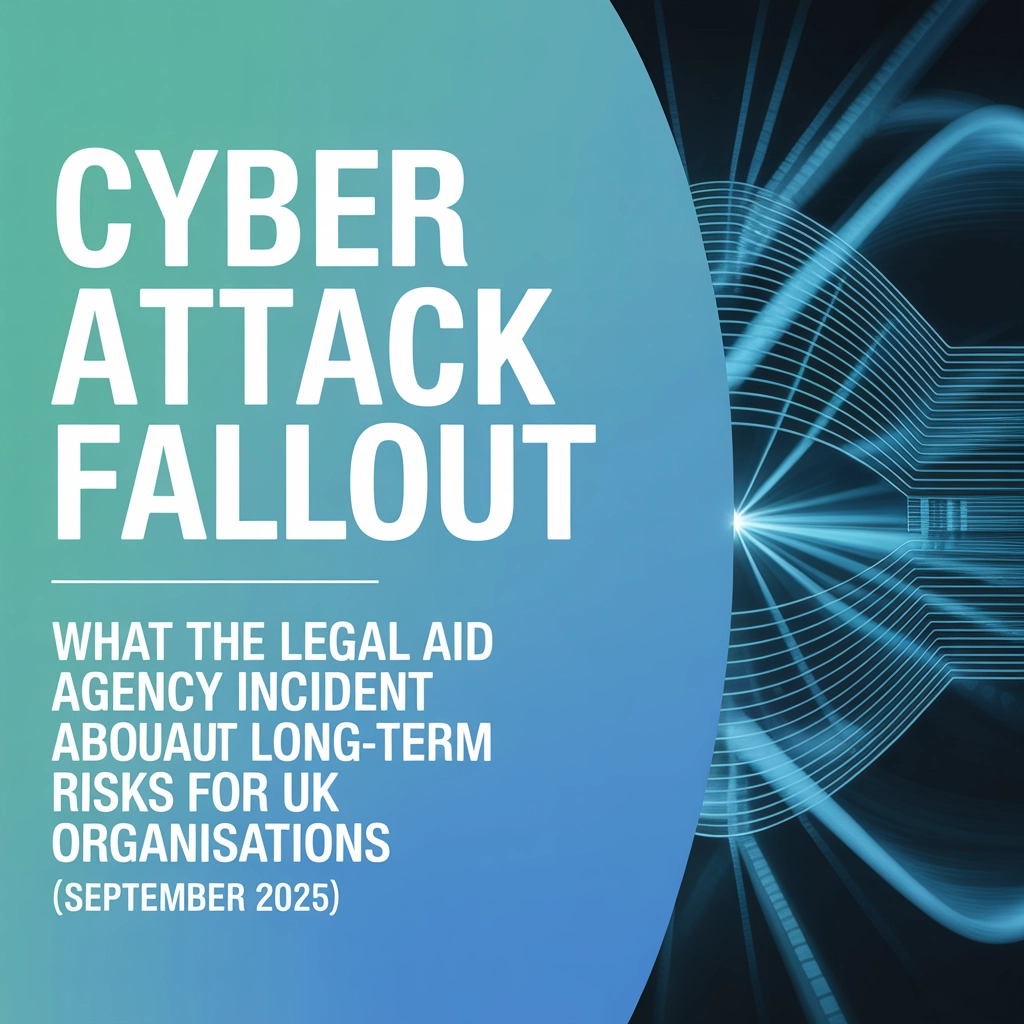On 1st September 2025, the Legal Aid Agency announced yet another operational disruption stemming from the devastating cyber attack that first hit their systems in April. The delay to civil schedule production serves as a sobering reminder that UK cyber security incidents create ripple effects lasting months beyond the initial breach headlines.
This latest development highlights a critical reality facing UK organisations today: cyber attacks are not discrete events with clear endings, but prolonged crises that can disrupt operations, erode trust, and create compliance headaches for extended periods. The Legal Aid Agency breach offers valuable lessons about the true cost of cyber vulnerabilities and the importance of proactive security measures.
The Original Legal Aid Agency Breach: A Timeline of Escalation
The Legal Aid Agency cyber attack began to unfold on 23rd April 2025, when officials first detected unauthorised access to their systems. What initially appeared to be a contained incident quickly revealed itself as one of the most significant UK government data breaches in recent years.
By 16th May 2025, investigators discovered the attack was far more extensive than originally assessed. The breach had exposed personal data dating back to 2007, affecting up to 2.1 million individuals including some of society's most vulnerable people: domestic abuse victims, criminal defendants, and families involved in legal aid cases.

The compromised data included names, addresses, National Insurance numbers, employment information, financial details, and in some cases, sensitive information about legal proceedings. The sheer scope forced the Legal Aid Agency to take their digital services offline entirely, implementing emergency contingency procedures that continue to affect operations months later.
Sarah Sackman, the Ministry of Justice minister, later attributed the successful attack to "fragile tech systems" resulting from "years of neglect" – a damning admission that highlights the systemic vulnerabilities affecting UK public sector organisations.
September 2025: The Long Tail of Operational Disruption
Fast-forward to 1st September 2025, and the Legal Aid Agency is still grappling with the aftermath. The announcement of delayed civil schedule production demonstrates how UK cyber security incidents create operational disruption that extends far beyond initial system restoration.
These civil schedules are administrative documents that inform legal aid providers about their contract allocations for the new financial year. While the delay does not affect day-to-day legal work or payments, it represents the kind of administrative friction that erodes efficiency and confidence in digital government services.
The fact that fundamental administrative processes remain disrupted nearly five months after the initial attack reveals the complex challenge of rebuilding secure, functional systems while maintaining service continuity. It also highlights how cyber attacks can create a cascade of smaller but persistent operational issues that compound over time.
What This Reveals About Long-term Cyber Risk in the UK
The Legal Aid Agency incident exposes several critical vulnerabilities that extend across the UK's organisational landscape, both public and private sector.
Legacy System Vulnerabilities
The 18-year span of exposed data points to a fundamental issue plaguing many UK organisations: legacy systems accumulating sensitive information over decades without adequate security updates. These systems become increasingly attractive targets for cybercriminals precisely because they often lack modern security controls while containing vast amounts of valuable data.
Many UK businesses and public sector organisations operate hybrid environments where critical functions depend on systems implemented years or even decades ago. The Legal Aid Agency breach demonstrates how these legacy environments can become single points of failure that expose entire organisational data estates.
The Compliance Time Bomb
The involvement of the Information Commissioner, National Crime Agency, and National Cyber Security Centre in the Legal Aid Agency response highlights how UK cyber security incidents now trigger complex regulatory processes spanning multiple agencies. Organisations face not just technical recovery challenges but prolonged compliance investigations that can last years.

Under GDPR and the Data Protection Act 2018, organisations must demonstrate they implemented appropriate technical and organisational measures to protect personal data. The Legal Aid Agency's admission of "years of neglect" suggests potential regulatory consequences that could set precedents for how UK authorities assess cyber security due diligence.
Interconnected Risk Exposure
The Legal Aid Agency attack affected not just the government agency but barristers, solicitors, and associated organisations throughout the legal aid ecosystem. This demonstrates how modern cyber attacks create cascading impacts through professional networks and supply chains.
UK organisations must recognise that their cyber risk extends beyond their direct control. Partners, suppliers, and service providers can all become vectors for attack or victims of collateral damage when interconnected systems are compromised.
Penetration Testing: A Critical Defense Against Long-term Risk
The Legal Aid Agency incident underscores why regular penetration testing represents such a vital component of UK cyber security strategy. Professional penetration testing can identify the kind of system vulnerabilities that enabled this attack before malicious actors exploit them.
Effective penetration testing should focus on several key areas highlighted by this incident:
Legacy System Assessment: Testing older systems and applications that may lack modern security controls but contain valuable data accumulated over years or decades.
Network Segmentation Validation: Ensuring that attackers cannot move laterally through systems to access data beyond their initial entry point, which appears to have been a critical failure in the Legal Aid Agency attack.
Data Access Controls: Verifying that access to sensitive personal data is properly restricted and monitored, particularly in systems handling information spanning multiple years.
Regular penetration testing helps organisations understand their actual security posture rather than their assumed security posture, identifying gaps before they become headlines.

Building Resilience: Lessons for UK Organisations
The Legal Aid Agency breach offers several actionable insights for UK organisations seeking to avoid similar long-term disruption:
Implement Proactive System Modernisation: Rather than waiting for budget approval during crisis response, organisations should establish regular technology refresh cycles that prevent systems from becoming legacy vulnerabilities.
Develop Mature Incident Response Capabilities: The three-week gap between initial detection and full scope assessment suggests many UK organisations lack the threat hunting and forensic capabilities needed for rapid incident containment.
Plan for Extended Recovery Timelines: The ongoing operational impacts five months after the initial attack demonstrate that cyber incident recovery should be measured in quarters or years, not weeks. Business continuity planning must account for these extended timelines.
Establish Cross-Sector Information Sharing: The interconnected nature of modern business relationships requires collaborative threat intelligence sharing to protect entire ecosystems rather than individual organisations.
The Role of Expert Security Assessment
The Legal Aid Agency incident demonstrates why organisations cannot rely solely on internal assessments of their security posture. The admission of "years of neglect" suggests that internal stakeholders may have been aware of system vulnerabilities but lacked the authority, resources, or expertise to address them effectively.
Independent security assessments, including comprehensive penetration testing and security architecture reviews, provide the objective analysis needed to identify and prioritise critical vulnerabilities before they become business-threatening incidents.

Expert security firms bring specialised knowledge of emerging attack techniques and industry best practices that internal teams may lack, particularly in organisations where cyber security has historically received limited investment.
Preparing for an Evolving Threat Landscape
The Legal Aid Agency attack appears to have been conducted by criminal groups rather than state-sponsored actors, highlighting how sophisticated attack techniques are becoming commoditised across the cyber threat landscape. UK organisations can no longer assume they are "too small" or "too boring" to attract professional cybercriminal attention.
The combination of vulnerable legacy systems, valuable personal data, and interconnected business relationships creates attractive targets across all sectors of the UK economy. Organisations must adopt a proactive security posture that assumes they will be targeted rather than hoping they will be overlooked.
This includes implementing robust monitoring and threat detection capabilities, maintaining current security patches and updates, and regularly testing incident response procedures through tabletop exercises and technical simulations.
Moving Forward: Building Cyber Resilience
The Legal Aid Agency incident serves as a watershed moment for understanding long-term cyber risk in the UK. The combination of initial data exposure, extended operational disruption, regulatory investigation, and reputational damage illustrates the true cost of cyber security failures.
UK organisations must recognise that cyber security represents critical infrastructure investment rather than optional technology spending. The "years of neglect" that enabled this attack are unfortunately common across many organisations that have deferred security investments in favour of other priorities.
The path forward requires sustained commitment to security modernisation, regular independent assessment of security postures, and collaborative approaches to threat intelligence sharing. Organisations that take proactive steps to identify and address vulnerabilities through professional security assessments will be far better positioned to avoid the kind of extended disruption still affecting the Legal Aid Agency months after their initial breach.
The cyber threat landscape will continue evolving, but the fundamental principles of proactive vulnerability management, robust incident response capabilities, and expert security assessment remain constant. UK organisations have an opportunity to learn from this incident and implement the security measures needed to protect themselves from similar long-term risks.
By investing in comprehensive security assessments and addressing identified vulnerabilities before they are exploited, organisations can avoid becoming the next cautionary tale about the true cost of cyber security neglect.












Leave a Reply